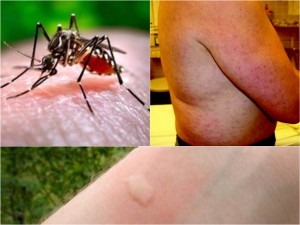
Summertime brings families from coast-to-coast outside to enjoy warmer weather, parties, camping, backyard grilling and more. The down side of hanging outdoors is that there’s no escaping insects! In fact did you know that at least 40 people a year die from allergic reactions to stings from bees or other insects, according to the American Academy of Allergy, Asthma & Immunology. Beyond bugs, summer is also peak poison ivy and poison oak season.
Most insect bites and stings and most cases of plant rashes aren’t a big deal and simply require TLC you can administer at home. But some insect bites can be potentially dangerous and require swift action with call to 911.
To help you know when to slather on an anti-histamine and stay at home vs. when to rush to the ER I created a Bug Bites of Summer 2014 Guide that you can read in order to keep your family healthy through the summer months. Read below, and I’ll break down the facts you need to know about Poison Ivy to summer’s most common spiders; as well as give you my doctor’s orders on what to do should you get bitten or stung while enjoying the sun and outdoors. Check out Part 1 below all about mosquitoes and stay tuned for more posts about other insects to avoid this summer.
Mosquitoes
THE FACTS
They’re one of the most common bug bites of summer, and most of the time their bites just cause itchy red spots. In your average case it’s key to just avoid scratching as much as possible, which is easier said than done but will truly make a difference.
Some mosquitoes can carry West Nile virus, which is a potentially serious (though not contagious), illness. The majority of cases of West Nile Virus appear between July and September in Midwestern and Southern states. This illness can appear anywhere from 3-14 days after being bitten. Most people who contract West Nile Virus don’t usually have mild symptoms that are self-limited and resolve. However, if you develop symptoms that include a stiff neck, muscle weakness, fever, headache, body aches, nausea or a rash on your torso, you should call the doctor! It is possible in severe cases of West Nile virus to have neurological issues, paralysis and even death. Therefore, it’s important to be aware of how your body feels and if you suspect things aren’t “right” check in with your healthcare provider immediately.
New on the scene this year is Chikungunya. It’s a virus carried by mosquitoes that’s been around since the 1950s in Africa and the Caribbean and now it’s hit the US, much like West Nile virus did 10 years ago, thanks to US tourists returning home from vacations. The interesting thing about this disease is the type of mosquito that carries it. Unlike most mosquitoes who appear and bite us from dusk to dawn, the mosquitoes that carry Chikungunya are the same mosquitoes that carry Dengue Fever and they bite during the daytime! So how can we avoid these annoying bugs. Well read on.
DOCTORS ORDERS:
To avoid mosquitoes, always use mosquito repellent! Now you have some choices. I recommend and so does the CDC wearing a an Environmental Protection Agency-registered insect repellent for your skin and clothing that has DEET or Picaridin. Now the higher the concentration (percentage) of DEET in the product the longer it will last and work. If you prefer to use an allnatural product that is DEET-free, which I would recommend for kids and pregnant women try oil of lemon eucalyptus.
Another must – STAY away from mosquito “homes” and prevent them from hanging out around yours! This means – avoid standing water, keep your gutters unclogged, don’t over soak potted plants. Mosquitoes LOOVE water, and even a capful from a water bottle is enough to have hundreds buzzing and breeding and ready to bite you.
If you find yourself in mosquito rich places make sure you wear protective clothing – long shirts and pants!
There’s no vaccine or specific antiviral treatments for West Nile or Chikungunya virus. But over-the-counter pain relievers can be used to reduce fever and relieve other symptoms.
BONUS TIP:
Mosquitoes are often lured in by sweat, alcohol, perfumes and dark clothing- so avoid these if you can!
Wishing you a bug free summer
xo
Dr. V